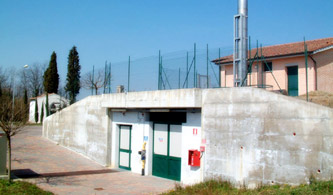 COUNTRY OF ORIGIN
COUNTRY OF ORIGIN• Italy
Community stakeholding, for managing local services
What problem does it solve?
Waste management and disposal is a difficult issue for any community. The public often wants the disposal plants closed down, considering them harmful to health and the environment.
In most cases, it is the type and quality of management (generally entrusted to private companies) that causes such problems. This is because privately run disposal plants focus more on profit than on other aspects such as environmental sustainability and impact on the local economy. In doing so, they often cause high levels of pollution of the air, water and soil. Private enterprises rarely attach much importance to issues such as employment and the quality of life of the local community. Furthermore, the closure of such plants often means the area is left with unregulated rubbish dumps, with all their associated problems.
For all these reasons, local populations generally see refuse disposal plants as being harmful to their area and to the local economy. In places where such plants are operating, there are often public campaigns calling for their closure. These tend to result either in the closing down of the sites or in the imposition of top-down decisions, which undermine support for local bodies.
By promoting a form of public management of refuse disposal plants, the local authorities can turn public opinion around. In fact, if these plants are operated in a way that is transparent, sustainable and profitable and which involves the direct participation of the community, they can become a significant resource for local social and economic development. A company like Belvedere S.p.A., which is technically a public/private enterprise (62% owned by the Municipality of Peccioli and with the rest in the hands of the community) that is run like a business, represents an innovative solution that enables refuse disposal operations to be managed in a participatory and transparent way. Belvedere has managed to keep pollution levels low, create employment opportunities, redistribute the revenues from the refuse disposal operation, and re-invest the profits in jointly agreed sectors.
Before implementing a direct public management of the site, the Municipality of Peccioli was having to cope with the problems typical of a badly run rubbish dump, which was struggling to handle the refuse from the six local municipalities. These communities and the provincial authorities were pressing for a total closure of the plant. However, the Municipality of Peccioli was in an economic crisis and lacked the funds needed to restore the local environment, which was experiencing an alarming level of pollution caused by the refuse being treated at the plant. Moreover, at the same time, the whole region was facing a refuse disposal crisis, caused by the shutting down of the incinerator in Florence, the largest in the Tuscany Region.
Thus, closure of the plant would have removed an important problem but it would have left all the others unresolved. It was against this backdrop, that the municipal authorities of Peccioli decided to seize the initiative. They submitted to the regional authorities a project to clean up the old site and to expand its capacity to process refuse, making this capacity available to the whole region. Benefiting in this way from outside funding as well as its own very limited resources, the Municipality of Peccioli took over the ownership and management of the plant.
Its management of the operations and its constant focus on local growth and development led the Municipality of Peccioli to decide, in 1997, to convert a stake in the enterprise into shares and to call upon all the citizens of Peccioli and the surrounding communities to purchase them.
Therefore, the Municipality set up the enterprise called Belvedere and allowed the citizens to become owners of it, so triggering strong growth through a widespread enterprise culture. 
The decision to go for public management of the rubbish dump and to take a long-term approach has enabled the public operator to regain its role as a planning agency and created an example of “governance” of local collective resources. With its refuse disposal plant, Peccioli is a fine example of bottom-up management headed by a collective body, the local authorities, and with the local population taking a direct and active role in policy-making and business operations.
DOWNLOAD THE BROCHURE PDF
english (0.8 MB)spanish (0.8 MB)
ONLY TEXT
•Community Stakeholding in practice







